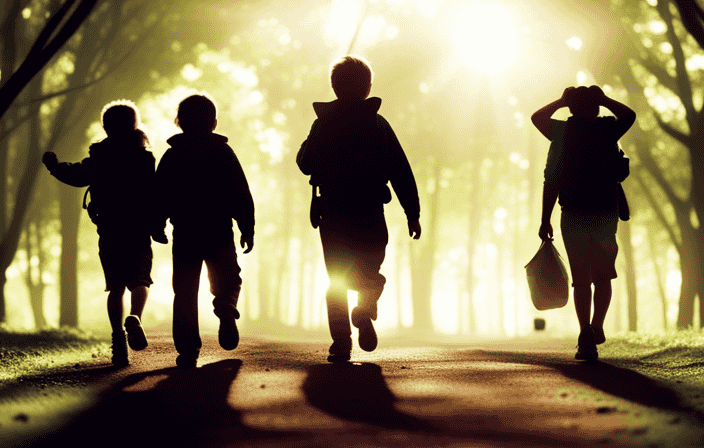Embark on a journey into hiking and birdwatching, where nature’s rejuvenating power is waiting to welcome you. These activities act as a gentle breeze, improving the health of children and providing a variety of benefits that go beyond just physical exercise.
From enhancing emotional and cognitive well-being to fostering social skills and promoting environmental responsibility, hiking and bird watching offer a gateway to exploration, growth, and lifelong appreciation for the natural world.
In this article, we delve into the evidence-based wonders of these outdoor pursuits, uncovering their profound impact on kids’ wellness.
Key Takeaways
- Hiking and bird watching boost emotional and cognitive well-being in kids.
- Nature exposure through hiking improves mood and provides light cardiovascular exercise.
- Outdoor activities like hiking and bird watching enhance problem-solving skills, memory, and cognition in children.
- Engaging in hiking and bird watching activities with kids promotes a sense of wonder, curiosity, and connection with nature.
The Healing Power of Nature
The healing power of nature is evident in its ability to enhance mental well-being, reduce stress and anxiety, increase creativity and imagination, and improve physical health, making it a valuable tool for boosting kids’ wellness.
The therapeutic effects of nature have been extensively studied and proven to have positive impacts on children’s overall well-being. Spending time in natural environments has been shown to reduce stress levels and promote relaxation, leading to improved mental health.
Nature also stimulates creativity and imagination in children, providing them with a space to explore and discover new things. Additionally, outdoor activities in nature promote physical health by encouraging exercise and physical activity.
Overall, nature acts as a healer, providing a range of benefits that contribute to the wellness and development of children.
Emotional and Cognitive Benefits
Emotional and cognitive benefits can be derived from engaging in outdoor activities such as hiking and bird watching, as they provide opportunities for mental stimulation and personal growth. These activities have been shown to boost resilience in children, helping them cope with stress and adversity. Spending time in nature fosters mindfulness, allowing children to be present in the moment and develop a deeper connection with their surroundings. Research suggests that exposure to natural environments can enhance cognitive function, including memory, attention, and problem-solving skills. Hiking and bird watching also encourage curiosity and exploration, promoting a sense of wonder and awe. By immersing themselves in nature, children can develop a greater appreciation for the world around them and cultivate a lifelong love for outdoor activities.
Physical Benefits
Engaging in outdoor activities such as hiking and bird watching has been associated with various physical benefits for individuals of all ages. For children, these activities provide an opportunity to improve their fitness and cardiovascular health. Here are five physical benefits that hiking and bird watching can offer:
- Increased physical activity: Hiking involves walking on uneven terrain, which helps improve cardiovascular fitness and strengthens muscles.
- Improved cardiovascular health: The continuous movement during hiking and the excitement of bird watching can elevate heart rate, promoting a healthy cardiovascular system.
- Enhanced endurance: Regular participation in these activities helps build endurance, allowing children to engage in physical activities for longer durations without getting tired.
- Strengthened muscles: Hiking uphill and navigating natural obstacles like rocks and tree roots engages various muscle groups, contributing to overall strength development.
- Weight management: Hiking and bird watching are calorie-burning activities that can aid in maintaining a healthy weight.
By engaging in these outdoor activities, children can improve their physical well-being while having fun and exploring nature.
Access to Nature
Access to nature has been shown to have numerous positive effects on children’s overall well-being and development.
For example, a study conducted in a rural community found that children who had regular access to natural spaces showed improved cognitive abilities and had a greater sense of curiosity and wonder compared to those who did not have such access.
Nature therapy, which involves engaging in outdoor activities and exploring natural environments, has been found to be particularly beneficial for children’s wellness. Outdoor exploration allows children to engage their senses, discover new things, and develop a deeper connection with the natural world. It promotes creativity, imagination, and problem-solving skills.
Moreover, spending time in nature has been found to reduce stress and anxiety in children, further enhancing their mental well-being.
Overall, access to nature plays a vital role in promoting children’s holistic development and should be prioritized in their daily lives.
Positive Effects on Mental Health
One significant impact of spending time in nature is its positive effects on children’s mental health. The healing power of nature has been shown to have a profound impact on children’s well-being. Studies have consistently shown that exposure to nature can reduce stress and anxiety in children. This can lead to improved mental health outcomes and increased overall happiness.
Nature also promotes a sense of wonder and curiosity in children, stimulating their imagination and creativity. Additionally, spending time in nature has been found to increase attention span and focus in children. This is particularly important in today’s fast-paced, technology-driven world.
By providing a break from screens and urban environments, nature allows children to recharge and improve their mental well-being.
Enhancing Social Skills
In addition to the positive effects on mental health, hiking and bird watching also play a crucial role in enhancing children’s social skills. These activities provide opportunities for children to build relationships with their peers, as well as foster teamwork and collaboration. Engaging in outdoor activities like hiking and bird watching allows children to interact with others in a natural and non-competitive setting, promoting positive social interactions and the development of important social skills.
To further illustrate the benefits of these activities on social skills, the following table highlights specific ways in which hiking and bird watching can foster relationship building and teamwork:
| Relationship Building | Fostering Teamwork |
|---|---|
| Sharing experiences and observations with others | Collaborating on identifying bird species or navigating trails |
| Supporting and encouraging one another | Dividing tasks and working together to achieve common goals |
| Engaging in conversations and discussions about nature | Communicating and coordinating actions while hiking or bird watching |
By engaging in these activities, children have the opportunity to develop and refine their social skills, which can have long-lasting positive effects on their relationships and interactions with others.
Long-Term Effects
The long-term effects of engaging in outdoor activities such as hiking and bird watching include the development of important social skills, fostering positive relationships with peers, and promoting effective teamwork and collaboration.
Outdoor exploration provides children with opportunities to interact with their environment and engage in group activities, which in turn enhances their social skills. By participating in outdoor activities, children learn how to communicate, cooperate, and negotiate with others, fostering positive relationships with their peers.
Additionally, outdoor activities often require teamwork and collaboration, which further develop their social abilities.
Moreover, engaging in outdoor activities such as hiking and bird watching can create a lifelong love for nature and outdoor activities, instilling a sense of wonder and appreciation for the natural world. This love for nature can lead to a greater sense of environmental responsibility and a commitment to preserving our natural resources.
Promoting Environmental Responsibility
Engaging in outdoor activities such as hiking and bird watching can foster a deep appreciation for the natural world, leading to a profound sense of environmental responsibility and a commitment to preserving our planet’s resources.
These activities provide children with opportunities to learn about and connect with wildlife, teaching them the importance of conservation. As children explore hiking trails and observe birds in their natural habitats, they develop a sense of awe and wonder for the diverse species that exist in our environment. This connection with wildlife can inspire a desire to protect and conserve these precious creatures and their habitats.
By engaging in these activities, children learn firsthand about the delicate balance of nature and the impact that human actions can have on it. This knowledge lays the foundation for a lifelong commitment to environmental responsibility and a sustainable future.
Frequently Asked Questions
Are there any specific hiking trails or bird watching locations that are recommended for kids?
Recommended hiking trails for kids include the Appalachian Trail, Great Smoky Mountains National Park, and Yosemite National Park. Bird watching locations for children include the Everglades National Park, Central Park, and the San Francisco Bay Area.
How can hiking and bird watching help children with attention deficit hyperactivity disorder (ADHD)?
Hiking and bird watching can benefit children with ADHD by enhancing their attention span, reducing symptoms, and promoting a sense of calm. Tips for incorporating these activities include setting achievable goals, providing structure, and allowing freedom for exploration.
What are some tips for parents to make hiking and bird watching enjoyable and engaging for kids?
Tips for engaging kids in hiking and bird watching include: 1) Plan age-appropriate trails and activities, 2) Bring binoculars and field guides, 3) Encourage curiosity and exploration, 4) Incorporate games and challenges, 5) Take breaks and provide snacks, 6) Foster a positive and supportive environment. These activities can benefit children with ADHD by improving focus, reducing symptoms, and promoting overall well-being.
Can hiking and bird watching help children develop a stronger connection with nature?
Hiking and bird watching can indeed help children develop a stronger connection with nature. Nature therapy has numerous benefits for children’s mental health, while outdoor activities have a positive impact on their overall well-being.
Are there any safety precautions or guidelines that parents should keep in mind when taking their kids hiking or bird watching?
When taking children hiking or bird watching, parents should consider safety precautions and guidelines. These include staying on designated trails, carrying essential supplies, teaching children about potential hazards, and supervising their activities. These engaging activities can foster a stronger connection with nature.









